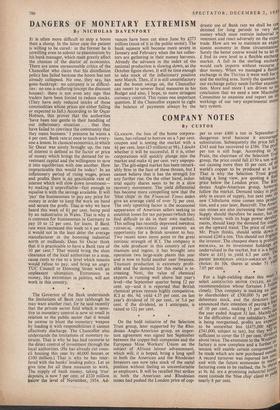DANGERS OF MONETARY EXTREMISM
By NICHOLAS DAVENPORT
IT is often more difficult to stop a boom than a slump. In the latter case the patient is willing to be cured : in the former he is unwilling even to submit to examination by his bank manager, which must greatly affect the chances of the doctor of economics. There are some unreasonable critics of the Chancellor who claim that his disinflation policy has failed because the boom has not already collapsed. No one, they say, has gone bankrupt : no company is in difficul- ties : no one is suffering (except the discount houses): there is not even any sign that traders have been forced to reduce stocks. (They have only reduced stocks of those commodities whose prices are either falling or expected to fall.) According to Sir Oscar Hobson, this proves that the authorities 'have been •too gentle in their handling of our inflationary situation . . . that they have failed to convince the community that they mean business.' I presume he wants a 6 per cent. Bank rate at once to teach every- one a lesson. In classical economics, in which Sir Oscar was surely brought up, the rate of interest is defined as the factor or price of money which brings the demand for in- vestment capital and the willingness to save it into equilibrium with one another. How impracticable this would be today! In an inflationary period of rising wages, prices and profits there is no practicable rate of interest which will slow down investment— by making it unprofitable—fast enough to equalise it with the savings available. It will 'pay' the businessman to pay any price for money in order to keep the work on hand and secure the profit. That is why we have heard this week of 8+ per cent. being paid by an industrialist in Wales. That is why it is common for businessmen in Germany to pay 10 to 12 per cent. for loans. If Bank' rate were increased this week to 6 per cent. it would not in the least deter the average manufacturer in the booming industrial north or midlands. Does Sir Oscar think that it is practicable to have a Bank rate of 10 per cent.? That would bring the slum clearance of the local authorities to a stop, cause rents to rise to a level which tenants would refuse to pay, and bring an angry TUC Council to Downing Street with an unpleasant ultimatum. Extremism in money, like extremism in politics, will not work in this country.
* * * The Governor of the Bank understands the limitations of Bank rate (although he may want another rise), for he said recently that the private sector field which is sensi- tive to monetary control is now so small in relation to the public sector that it would be unwise to blunt the monetary weapon by loading it with responsibilities it cannot effectively discharge. The Chancellor also understands the limitations of monetary re- straint. That is why he has had recourse to the direct control of investment through the local authorities. (He has already cut coun- cil housing this year by 40,000 houses or £100 million.) That is why he has inter- fered with the banks' lending policy. Let us give time for all these measures to work. The supply of bank money, taking 'true' deposits, is now 5 per cent, of £320 million below the level of November, 1954. Ad- vances have been cut since June by £273 million (most of it in the public sector). The bank squeeze will become more severe in January and February when the tax collec- tors are gathering in their money harvests. Already the advance in the index of the national production is slowing down, as the October figure shows. It will be time enough to take stock of the inflationary position next March. Then, if it is still unsatisfactory and the boom swings on, the Chancellor can resort to severer fiscal measures in his Budget and also, I hope, to more stringent currency control. This raises one important question. If the Chancellor expects to right the balance of payments always by the none'
corn deer al in' xpo xpaa" nces1 et the haNe han0 se to exihR or 11 On (// mine.
o the illae n the none. drastic use of Bank rate we shall be demned for long periods to very money which must restrain industri vestment and react adversely on the e trade. How are we to maintain an e sionist economy in these circumsta Surely the better course would be to I £ find its own level in a flexible exc market. A fall in the sterling exc would curb imports without recour 'dear money. When we managed a fl exchange in the Thirties it went well i and the sterling area. Surely the questi our exchange policy needs further exa tion. More and more I am driven t conclusion that we need a new Macr Committee to examine and report o workings of our very experimental
system.


































 Previous page
Previous page